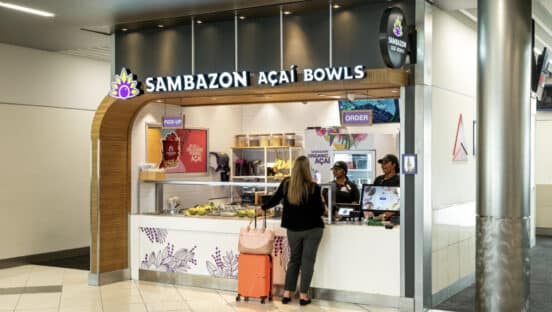Andrew Stern’s New York City–based company, Five Points Partners, owns franchises of several brands, including Dunkin’ Donuts, Subway, and Five Guys Burgers and Fries. After seven years as a franchisee under different brands, Stern knows the difference between a strong and productive relationship among franchisees and franchisor and a bad one.
One of Stern’s telltale signs of a great franchisor is the level of support offered by the brand—even during an economic slump when revenues and resources are low.
“The most telling thing with Five Guys is when you open a new store in their system, they’ll send out a slew of people to help you open the store and they stay with you for weeks in order to get the store running, and it’s at no cost,” Stern says. “That’s such a huge offering from a franchisor. At the opposite end of that spectrum, we’ve worked with brands that when you open a store, they may or may not have a corporate person show up the day you open the doors. The major difference when dealing with a good brand is that you feel the district manager is there to help you versus there to police you.”
For quick-serve franchises to not just survive but thrive as they climb out of the recession, a strong relationship between franchisee and franchisor is essential, experts say.
“Now more than ever we have to be very diligent and very close to our franchisees and listen to them,” says Randy Murphy, president and CEO of Austin, Texas–based Mama Fu’s. Murphy went from being a Mama Fu’s franchisee to franchisor when his company, Murphy Adams Restaurant Group, purchased the Pan-Asian concept in early 2008.
“We need to get feedback from our franchisees about what’s working, what’s not, what they need, what they’re missing, and what they’re hearing from customers,” Murphy says. “We’ve got to have our ear out there for them.”
Like Stern, Murphy knows all too well what it’s like to experience a relationship breakdown between franchisee and franchisor and the struggle it creates for operators. When Murphy was with Mama Fu’s as the brand’s largest franchisee, he says he received little, if any, training and support from the company.
“The former owners didn’t do a whole lot to put a good infrastructure in place,” Murphy says. “They had a portfolio of brands and they only focused on a few of them, unfortunately, so we were kind of left out there on a wing. So we’ve decided to really take a leadership position and offer tools to our franchisees when we bought the brand from them.”
It’s leaving franchisees “out on a wing” that franchising consultant Karen Spencer says weakens the franchisee-franchisor relationship and can ultimately cause a store to fail—especially during tough economic times.
“The restaurant franchise industry hasn’t done a good job of providing the necessary training, tools, and continued support to their franchisees on the day-to-day business functions of operating a quick-serve restaurant,” says Spencer, who believes that franchisors shouldn’t just assume that franchisees have the knowledge and experience to run a successful business.
“We assume that franchisees are going to go learn how to be a business owner all on their own,” Spencer says. “They have to proactively take on that [business] education themselves because the franchisor isn’t going to teach them that—they’re going to teach them how to run the restaurant.
“I think the ideal relationship is for the franchisor to recognize this breakdown and increase education and training. That’s all they need to do to make that relationship better.”
Spencer says she has seen a distinct shift in the franchising industry that started long before the economic meltdown of the past few years. Spencer analyzed franchising conference agendas and says that 20 years ago, about 70 percent of the material presented at conferences was focused on supporting and educating the franchisees and helping them grow their businesses.
“When you look at how many subjects are on business education today, you see that that has reduced by 30 percent,” she says. “And what has replaced it is, ‘How do we sell more franchises?’ Franchisors need to step up and increase support. They need to admit that they didn’t sign automatic business owners, they need to add education programs, they need to look at their existing levels of support and ask, ‘Is this enough for our franchisees?’ I think some brands are going to be in severe trouble if they don’t do that.”
But the responsibility isn’t all on the franchisor. Franchisees need to understand the brand that they are buying into and keep the franchisor informed of what’s going on in day-to-day operations, says Chris Carver, vice president of franchising for Lake Forest, California–based Johnny Rockets.
Spencer says franchisees should be proactive and reach out to other store operators for mentoring and education and not assume that franchisors will teach them the basics of how to run a successful business. “Franchising is a very generous industry and extremely loyal,” she says. “And they have no problem helping each other.”
Failing to nurture and grow the franchisee-franchisor relationship can result in a lose-lose outcome for all parties if the store ultimately fails. Spencer says the franchisee loses his investment, the franchisor loses royalties, and the consumer loses the brand in his community.
“I don’t think it’s being taught right on both sides. I think people jump into it, and they have no idea what they’re getting into and they don’t get educated properly,” Spencer says.
Experts agree that the best way to climb out of the recession is to think of the franchising relationship as a partnership, with everyone facing the same struggles and, in turn, celebrating the same victories.
“I think the franchising relationship is more important than ever in the struggling economy,” Carver says. “We’re all in the same boat; we’re all suffering the evils of the recession. It’s important as a brand to keep as many people afloat as possible. In a struggling economy, it’s important to talk to the guys that live and die behind the counter every single day because they are hearing what the customers are saying, they’re seeing what’s selling, and the overall attitude out there. You’re missing the boat if you don’t pay attention to that.”







